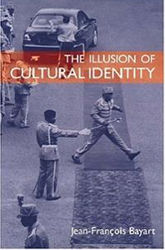 A while back a couple Edge posts appeared on the topic of “code switching” (Merinda’s post is here and Monica’s is here). Listening to NPR this morning I heard a story on the NSA’s use of codewords for its various clandestine projects — how it follows longstanding conventions in writing them as one word and in all caps, like SHARKFINN, KEYSTONE, or DISHFIRE — and that made me think again on the topic of code switching. Continue reading ““They’ve Given You a Number and Taken Away Your Name””
A while back a couple Edge posts appeared on the topic of “code switching” (Merinda’s post is here and Monica’s is here). Listening to NPR this morning I heard a story on the NSA’s use of codewords for its various clandestine projects — how it follows longstanding conventions in writing them as one word and in all caps, like SHARKFINN, KEYSTONE, or DISHFIRE — and that made me think again on the topic of code switching. Continue reading ““They’ve Given You a Number and Taken Away Your Name””
The Jurisdiction of the Edge
On the Modernity of History
 Andie Alexander, Culture on the Edge’s Curator, has posted once again on the Grad Blog for the Department of Religious Studies at the University of Alabama on how present interests drive historical narratives.
Andie Alexander, Culture on the Edge’s Curator, has posted once again on the Grad Blog for the Department of Religious Studies at the University of Alabama on how present interests drive historical narratives.
Take a look.
Bayart on Dressing the Part

The versatility of clothing makes it a preferred means for constructing and negotiating identities; not only individual identities (just think of a teenager’s anxieties when choosing clothes!), but also collective ones. Clothes make the man, and political actors are well aware of this…. As for the military dictators of the twentieth century, they often thought that it sufficed to appear on television in a three-piece suit in order to civilise their regimes and reassure public opinion. One might say, again parodying the French title of J. L. Austin’s book How to Do Things with Words, ‘Dressing is doing.’ (195-6)
[This is one of an ongoing series of posts, quoting from Bayart’s The Illusion of Cultural Identity, that further documents the theoretical basis
on which Culture on the Edge is working.]
Trick or Trick?
 A recent occurrence of misrecognition reminded me of two Culture on the Edge blog posts written this past summer (see here and here) in which Russell McCutcheon wrote about what it might mean to see the ordinary as curious in one post and another on public conversations on the role of identity in the movie, The Lone Ranger. In the former post, McCutcheon asked a simple question underneath a picture of Baka people performing for Pope Benedict XVI as he departed for Angola, “who is wearing a costume?”
A recent occurrence of misrecognition reminded me of two Culture on the Edge blog posts written this past summer (see here and here) in which Russell McCutcheon wrote about what it might mean to see the ordinary as curious in one post and another on public conversations on the role of identity in the movie, The Lone Ranger. In the former post, McCutcheon asked a simple question underneath a picture of Baka people performing for Pope Benedict XVI as he departed for Angola, “who is wearing a costume?”
If we take seriously theories of performativity and the role of the discursive in processes of identification as forcefully articulated by thinkers such as Judith Butler, then we know that something like Halloween occurs every day where we un/consciously present who we are/aren’t/want to be to the social world in which we participate in. Continue reading “Trick or Trick?”
Bayart on Contextual Identification
“Historical experience shows that an individual’s act of identification is always contextual, multiple, and relative. For example, someone from Saint-Malo will define himself as a resident of that town when dealing with someone from Rennes, as a Breton when dealing with someone from Paris, as French when dealing with some from Germany, as a Continue reading “Bayart on Contextual Identification”
Bayart on Processes

“Whereas culturalist reasoning posits the existence of a permanent inner core peculiar to each culture that confers on the latter its veridical nature and determines the present, analysis reveals a process of cultural elaboration in the areas of ideology and sensibility that speaks to us of the present by fabricating the past…. For the culturalist believes Continue reading “Bayart on Processes”
Bayart on Fabricating the Popular
“Popular cultures themselves — whose definition by intellectuals was, as we have seen, a highpoint of the movement of identity-related closure — have never been as homogenous as they were supposed to be by the theoreticians of the invention of tradition, and in particular by the nationalists of Central and Eastern Europe. Continue reading “Bayart on Fabricating the Popular”
There’s No Place Like Home, Part 2: How You (Yes, You) Became My Data
 A few weeks back, I published a post about the interesting politics behind regional identity, focusing specifically on Kansas City, which is where I currently live. In that post, I talked about how the narrative of “flyover country” allows certain regions of the United States to be highlighted as valuable, interesting, or otherwise unique at the expense of others depicted as having little cultural value, this despite the fact that such portrayals are often patently false or otherwise completely subjective. If I may quote and condense that post, my main point was this: Continue reading “There’s No Place Like Home, Part 2: How You (Yes, You) Became My Data”
A few weeks back, I published a post about the interesting politics behind regional identity, focusing specifically on Kansas City, which is where I currently live. In that post, I talked about how the narrative of “flyover country” allows certain regions of the United States to be highlighted as valuable, interesting, or otherwise unique at the expense of others depicted as having little cultural value, this despite the fact that such portrayals are often patently false or otherwise completely subjective. If I may quote and condense that post, my main point was this: Continue reading “There’s No Place Like Home, Part 2: How You (Yes, You) Became My Data”
Pull It Over, Buddy…
 Recently I published a post here on keeping our eyes on processes instead of their outcomes — on verbs and not nouns. I used the grammatical type known as a gerund as the way into this topic, linking to a Purdue University site that defined it as
Recently I published a post here on keeping our eyes on processes instead of their outcomes — on verbs and not nouns. I used the grammatical type known as a gerund as the way into this topic, linking to a Purdue University site that defined it as

 See the make-over to which Travis refers
See the make-over to which Travis refers 
